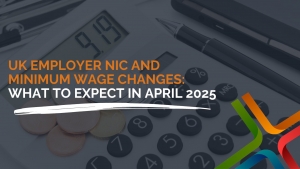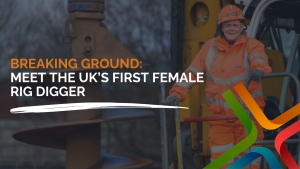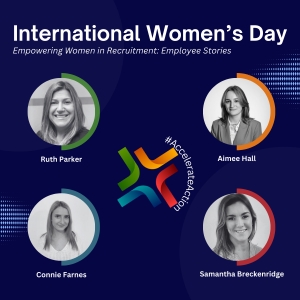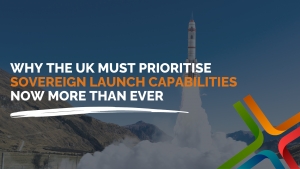As we move toward April 2025, employers across the UK are set to face significant changes to both National Insurance Contributions (NICs) and National Minimum Wage (NMW) rates, following announcements made in the Autumn 2024 Budget. These changes will affect payroll costs, compliance, and financial planning for businesses large and small.
In this blog, we'll dive into the details of the upcoming changes and provide key insights on how employers can prepare for these adjustments. These updates are designed to align wages with inflation, support low-paid workers, and ensure the continued sustainability of the UK's social security system. However, they come with a hefty price tag for employers.
1. National Minimum Wage and National Living Wage Increases
From 1 April 2025, the government will implement significant increases to the National Minimum Wage (NMW) and National Living Wage (NLW). These changes aim to boost earnings for lower-paid workers and move closer to the government’s target of two-thirds of the median wage.
Here are the key rate changes:
- Ages 21 and over: A 6.7% increase from £11.44 to £12.21 per hour.
- Ages 18-20: A 16.3% increase from £8.60 to £10.00 per hour.
- Ages 16-17 and apprentices: An 18% increase from £6.40 to £7.55 per hour.
These increases reflect the government’s commitment to reducing the earnings gap and improving the quality of life for workers on low wages. Employers will need to adjust their payroll systems to ensure compliance with the new rates. Failing to do so could result in hefty fines and reputational damage.
2. Changes to Employer National Insurance Contributions (NICs)
Starting 6 April 2025, the National Insurance Contributions (Secondary Class 1 Contributions) Bill 2025 will introduce several key changes to employer NICs. These changes are aimed at supporting the government’s fiscal policies, but they will come with a significant increase in employer costs.
The changes include:
- Increased NIC rate: The rate for secondary Class 1 NICs (the NICs employers pay on employee earnings) will increase from 13.8% to 15%.
- Lower threshold: The secondary threshold for Class 1 NICs will decrease from £9,100 to £5,000. This means an additional £4,100 of each employee’s income will now be subject to NICs.
- Increased Employment Allowance: The Employment Allowance will rise from £5,000 to £10,500, and the eligibility criteria will be adjusted. The new rules will remove the £100,000 secondary NIC threshold, meaning more employers—particularly smaller businesses—will be eligible for the allowance.
3. Impact of National Insurance and Minimum Wage Changes on Employers
These combined changes will lead to an increase in payroll costs, which could impact the financial health of many businesses. For employers, the challenge will be managing the additional financial burden while maintaining compliance with the revised rules.
How to Prepare for Rising Payroll Costs
Employers should take several steps to prepare for the changes:
- Budget adjustments: Employers should assess how the increase in NICs and minimum wage rates will affect their payroll budgets. Sectors with a high number of lower-paid workers, such as retail, hospitality, and care services, will face the largest financial impacts.
- Financial forecasting: Employers can use financial modelling to predict the increased costs and identify areas where they can increase efficiency. Planning ahead will help cushion the financial blow.
- Reassessing workforce strategies: Employers may need to reconsider their staffing levels, working hours, and pay structures to maintain financial sustainability. This might include exploring automation, outsourcing, or adjusting employee benefits.
How the Employment Allowance Can Help
The higher Employment Allowance provides some relief, especially for smaller employers. By increasing the allowance to £10,500, the government aims to support businesses by offsetting a portion of the increased NICs. Employers who were previously ineligible for the Employment Allowance due to their NIC liabilities exceeding £100,000 should re-evaluate their eligibility under the new rules and apply for the allowance if they now qualify.
4. Compliance and Systems Updates
As the April 2025 deadline approaches, it is critical that employers update their payroll systems to reflect the new NIC thresholds, rates, and minimum wage levels. Non-compliance with the revised National Minimum Wage and National Living Wage requirements could lead to penalties and even legal action.
Key compliance steps for employers:
- Review pay practices: Ensure that pay rates comply with the new minimum wage and living wage rates. This includes both hourly and salary-based employees.
- Update payroll systems: Adjust systems to reflect the new NIC rates and thresholds. It is also advisable to conduct a trial run before the changes take effect to ensure systems are working smoothly.
- Communication with employees: Employers should keep employees informed about any changes that may affect their pay. Transparency and clear communication will help maintain employee trust and morale during this period of adjustment.
5. The Road Ahead: Strategic Workforce Planning
While the increases in NICs and minimum wage rates will present challenges, they also create an opportunity for businesses to rethink their workforce strategies. Employers should look at long-term workforce planning to ensure they can manage the additional costs while remaining competitive in the labour market.
This could involve:
- Investing in employee development: Offering training or career progression opportunities to increase workforce productivity.
- Promoting flexible working: Employers may need to assess whether remote work or flexible hours can help reduce operational costs, particularly in sectors where physical presence is not always necessary.
- Exploring automation: Businesses may want to consider automating routine tasks to offset some of the increased costs associated with the wage increases.
Forward Planning
In summary, the National Insurance Contributions and National Minimum Wage changes set to take effect in April 2025 will have a significant impact on payroll costs for employers across the UK. By preparing in advance, reviewing financial forecasts, and ensuring compliance, businesses can navigate these changes successfully.
The higher Employment Allowance, while beneficial, may not fully offset the increased NIC liabilities for larger businesses. However, smaller businesses will benefit greatly from the expansion of eligibility. The key for employers is to start planning now—budgeting for the new rates, revisiting workforce strategies, and ensuring all payroll systems are updated in time.
These changes reflect the government's ongoing efforts to support low-income workers and ensure that businesses contribute fairly to the social security system. By proactively managing these adjustments, employers can not only ensure compliance but also position themselves for sustainable growth in the years to come.
For more updates on National Insurance and National Minimum Wage changes, be sure to follow official HMRC communications or reach out to our payroll staff if you have any queries – recruit@alexander-assoc.co.uk

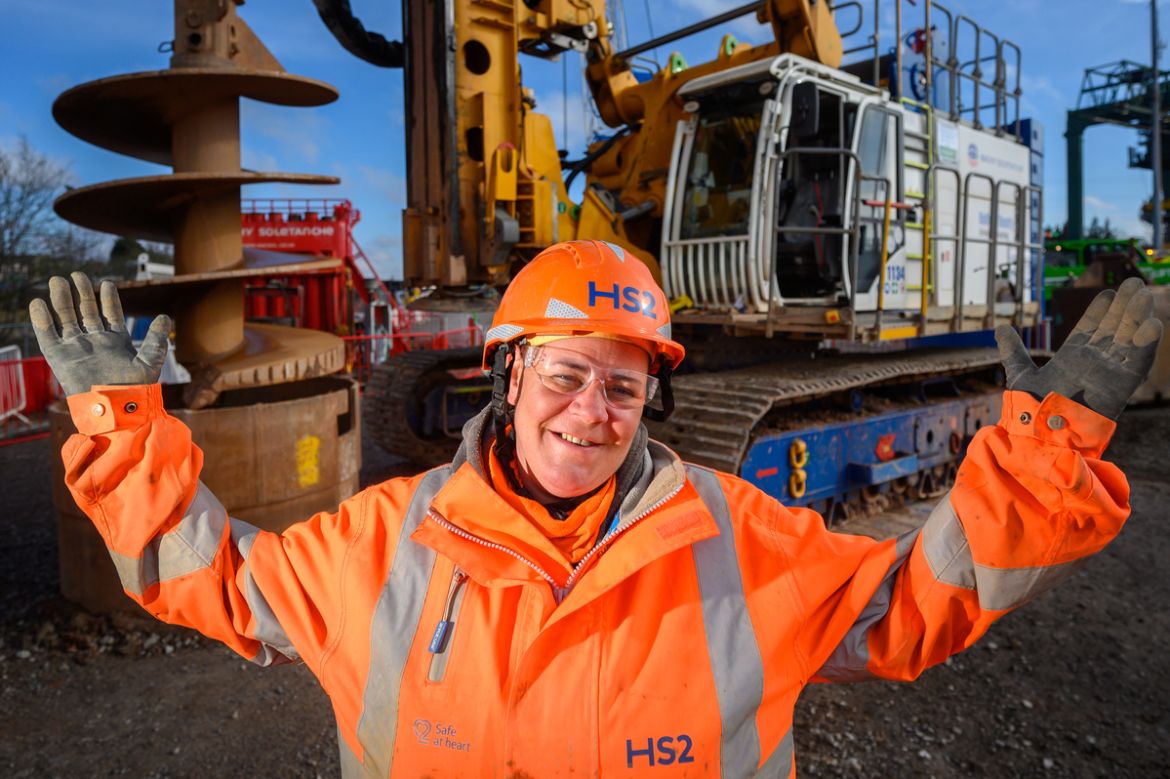
At 44, Natalie Smith is carving out history as the UK's first female rig driver, proving that it’s never too late to pursue a new path. A mother of one and now a proud member of the growing "orange army" helping build Britain’s new railway, Natalie is an inspiring trailblazer in the construction industry.
Now living in Castle Bromwich, Natalie transitioned from her job as a forklift truck driver in warehouse operations after witnessing the HS2 construction near her home. Determined to be part of something bigger, she joined SB3—a joint venture between Bachy Soletanche and Balfour Beatty Ground Engineering. Natalie excelled in their rigorous training program and, in September 2023, earned her Rig Driver accreditation from CITA, officially making her the first woman in the UK to achieve this status.
Leading the Way on HS2
Now five months into her role, Natalie works as part of a 14-person team along the HS2 route in Birmingham, between Saltley and Curzon Street. She currently leads the piling operation for the Duddeston Junction viaduct, a project requiring 110 piles. Despite the immense responsibility, Natalie embraces the challenge, crediting her team's unwavering support for her success.
"Apparently, I’m the first female in the UK to qualify as a Rig Driver, which makes me feel really proud of what I’ve achieved," Natalie shared. "On site, I am the only female in the rig team, but it doesn’t bother me, or the lads—everyone is just so supportive."
Her son is equally proud, often asking her at the end of the day, "How many holes have you dug today, Mum?" And her mother remains in awe of the massive machinery Natalie commands.
Shifting the Landscape for Women in Construction
Natalie’s achievement is even more remarkable against the backdrop of a traditionally male-dominated industry. As of Q3 2024, women made up only 14.7% of the UK construction workforce—about 303,000 women compared to 1.76 million men. In highly specialised roles like rig driving, female representation has historically been almost non-existent.
However, change is underway. HS2 has been a driving force for diversity, with 30% of its Tier 1 supply chain workforce being female in 2022/23—well above the industry average. Additionally, organisations like Balfour Beatty VINCI have launched targeted initiatives, such as a women-only Introduction to Construction course at South and City College in Birmingham, designed to fast-track women into industry roles within 6-8 weeks.
Building a More Inclusive Future
Despite progress, barriers remain. A 2024 report highlighted persistent challenges like inflexible work environments, male-dominated cultures, and a lack of awareness about career opportunities for women in construction. Addressing these issues requires a collective effort:
- Education & Outreach: Schools and industry leaders must promote construction careers to young women, showcasing the diverse roles available.
- Mentorship & Support: Programs pairing female newcomers with experienced mentors can provide guidance and build confidence.
- Inclusive Workplace Policies: Companies must actively cultivate environments where women feel valued, respected, and have equal opportunities for growth.
Natalie Smith’s groundbreaking success exemplifies the limitless potential for women in construction when given the chance. Her story is a beacon of possibility, showing that with determination, support, and opportunity, women can not only participate in but lead the way in shaping the infrastructure of tomorrow.
By continuing to break down barriers and champion diversity, the industry can move toward a future where stories like Natalie’s become the norm rather than the exception.
Sources:

Ruth Parker – Director & Co-Owner, Alexander Associates
Can you share some details about your background and the path your career has taken up until now?
I started my career in recruitment 22 years ago, working my way up from Consultant to Divisional Manager before becoming a Director. Today, I am one of the owners of Alexander Associates. I am driven by a desire to be successful and to deliver a service to clients and candidates that was honest and ethical. Recruitment is about more than just placing people in jobs—it’s about building trust, creating meaningful opportunities, and making a genuine impact on people’s careers and businesses. Alongside my work in recruitment, I am a strong advocate for gender diversity and inclusion, particularly in engineering—a sector where representation is still evolving.
What’s your proudest achievement in your recruitment career so far?
One of my proudest achievements has been launching the #ShesAnEngineer campaign, which highlights the careers of inspiring women in engineering. Through this initiative, we’ve showcased the achievements of women in a traditionally male-dominated field, helping to change perceptions and encourage more young women to consider engineering careers. Additionally, making Alexander Associates a company with a 50% female board of directors has been a significant milestone, demonstrating that leadership roles in recruitment—and beyond—should be accessible to everyone, regardless of gender.
What challenges do you think women in the recruitment industry face, and what steps can we take to address them?
Despite many women excelling as recruitment consultants, leadership remains heavily male-dominated due to unclear career progression pathways, work-life balance challenges, industry biases, and a lack of female mentors and sponsors. Many agencies promote ‘top billers’ into leadership without structured management training, which can favour those who push aggressively for promotions rather than those with leadership potential. This creates a cycle where women, who may excel at relationship-building and strategic thinking, are overlooked in favour of those who fit a more traditional "sales-first" leadership model.
One of the biggest barriers is the informal networking and relationship-building practices that have historically favoured men. Many senior-level deals and promotions happen outside of the office—whether over drinks, in private networking groups, or on the golf course. I personally experienced this early in my career when clients would hold Golf Days, which I wasn’t invited to. These weren’t just social events; they were where key deals were done, relationships were strengthened, and strategic partnerships were formed. The exclusion of women from these spaces meant they weren’t part of those crucial, career-defining conversations, reinforcing the male-dominated leadership pipeline.
This "boys' club" culture still exists in some areas, making it harder for women to break through to business ownership and senior leadership. Unless recruitment businesses actively change these dynamics, women will continue to be at a disadvantage when it comes to leadership opportunities.
To remove these barriers, businesses need to:
- Create structured leadership pathways that value mentorship, strategic skills, and emotional intelligence, not just top billers.
- Normalise flexible leadership roles, making it easier for women balancing caregiving responsibilities to step into senior positions.
- Break the cycle of informal male networking by actively inviting women into decision-making spaces—whether that’s industry events, investment conversations, or leadership discussions.
- Encourage women to advocate for themselves and apply for leadership roles even if they don’t meet 100% of the criteria. Men apply when they meet 60%; women often wait until they meet every requirement.
- Ensure male leaders act as sponsors, actively championing talented women and bringing them into leadership discussions.
How can women in recruitment collaborate to offer support, mentorship, and encouragement to one another?
- Mentorship & Sponsorship – Women in leadership should not just mentor but actively sponsor other women—helping them gain visibility, get promotions, and take on leadership roles.
- Breaking Barriers in Networking – Women must build their own professional networks and ensure they are included in key industry discussions. If leadership conversations are happening on the golf course or in private networking groups, we need to create spaces where women are equally visible and influential.
- Advocating for Change in Company Culture – Senior women in recruitment must push for more inclusive leadership structures, ensuring leadership styles and promotions are based on merit, not outdated perceptions of what a leader should look like.
- Amplifying Each Other’s Voices – One of the most powerful ways women can support each other is by ensuring each other’s achievements are recognised. Too often, women downplay their successes—we should be promoting and celebrating each other at every opportunity.
- Encouraging Women to Take Risks – Many women hesitate to step into leadership or business ownership due to risk aversion. We need to encourage more women to embrace entrepreneurship, invest in themselves, and see leadership as an achievable goal.
Ultimately, true change happens when both men and women actively work to remove the barriers that have kept leadership so male-dominated for so long. If we shift the culture, normalise different leadership styles, and ensure women are part of key conversations and opportunities, we can create a more balanced and diverse recruitment industry.
Is there a female role model who has inspired you? Who is she, and what about her inspires you?
Dame Stephanie "Steve" Shirley – Tech Entrepreneur & Advocate for Women in Business
- She broke into the male-dominated tech industry in the 1960s, a time when women were rarely taken seriously in business.
- In 1962, she founded a software company, Freelance Programmers, which was one of the first businesses to focus on remote work, long before it became mainstream.
- To be taken seriously in a man's world, she signed her name as "Steve Shirley" in business letters—otherwise, men wouldn’t respond.
- She hired and championed women in tech, creating opportunities for female software engineers, many of whom were mothers who needed flexible working hours.
- Her company became hugely successful, winning contracts with major businesses and even working on software for the black box flight recorders used in airplanes.
- When she eventually sold the business, she made 70 of her employees’ millionaires, most of them women.
- Today, she is a philanthropist focusing on autism research, tech innovation, and women in STEM.
- She challenged gender norms in one of the most male-dominated industries.
- She was a true innovator in remote work, flexible careers, and women’s empowerment.
- She built a multi-million-pound business from scratch, proving that women entrepreneurs can thrive even in challenging environments.
- She gave back by supporting women and children through philanthropy.
If you were to offer advice to women working in recruitment and aiming for leadership roles, what would you say?
Own your ambition and be unapologetic about it. Too often, women hold back from putting themselves forward for leadership roles because they feel they need to be 100% qualified before stepping up. In reality, confidence and resilience are just as important as experience. Seek out mentors, advocate for yourself, and remember - you belong at the table.

Aimee Hall - Recruitment Consultant, Alexander Associates
Can you share some details about your background and the path your career has taken up until now?
I began my career as an office administrator at an Estate Agents, but after quickly reaching the limits of what the role could offer, I made the bold decision to transition into recruitment. I joined the Structural Engineering division at Alexander Associates, and with the guidance and support of my team, I quickly progressed from Trainee Recruitment Consultant to Consultant, where I moved into our new Space division to help drive its growth.
What’s your proudest achievement in your recruitment career so far?
The achievement I’m most proud of in my recruitment career is the way I’ve pushed myself outside of my comfort zone on a daily basis. From networking to public speaking, I’ve seen a remarkable boost in my confidence in this role. The messages I receive from satisfied candidates and clients make it all worthwhile.
What challenges do you think women in the recruitment industry face, and what steps can we take to address them?
One of the biggest challenges women in recruitment face is the gender bias and stereotypes about our capabilities, especially in male-dominated industries like engineering, where we are often underestimated.
How can women in recruitment collaborate to offer support, mentorship, and encouragement to one another?
It’s essential to have more female role models in the recruitment sector who can offer guidance on overcoming challenges and advancing in our careers. We need to work together to spread awareness of the bias and actively work toward creating a more diverse, educated and inclusive workforce.
Is there a female role model who has inspired you? Who is she, and what about her inspires you?
It may sound cliché, but my mum is undoubtedly my role model. From the very beginning, she was committed to raising me to be a strong, independent woman who advocates for herself and is not intimidated by the opinions of others. Her strength and compassion continue to inspire me, and I've learned that I am capable of far more than I ever thought possible.

Samantha Breckenridge - Head of Green Energy & Sustainability – Executive Search, Alexander Associates
Can you share some details about your background and the path your career has taken up until now?
I’m Samantha, and I currently lead the Green Energy and Sustainability Executive Search team at Alexander Associates. Our firm has a strong legacy in technical recruitment, and I’m thrilled to play a role in connecting top talent with opportunities in the growing green energy sector.
I began my career in 2007 within early years education, where I developed a passion for helping individuals grow and thrive. Following this, I started my degree in child psychology while continuing to work in the private schooling system. I later became the Manager of a startup nursery, hiring the entirety of the team. This journey led me to transition into education recruitment, where I refined my skills in matching the right talent to the right opportunities. In 2022, I took a career break to travel around South East Asia and Fiji, where I got my PADI certifications. It was an eye-opening experience, seeing diverse marine life up close and really understanding how important it is to protect our oceans and coral reefs. It’s something I’ve carried with me since.
After returning from my travels, I transitioned into executive search, specifically within strategy and corporate development, where I’ve honed my expertise in sourcing top-tier talent. Today, I’m excited to combine my recruitment skills with my passion for sustainability and marine life, helping to drive meaningful change in the green energy sector.
What’s your proudest achievement in your recruitment career so far?
My proudest achievement in recruitment has been the opportunity to work within the Green Energy and Sustainability sector, especially at such an exciting time. It's been amazing to see sustainability shift from a niche idea to something that’s now central to business and society. What really excites me is how sustainability today goes beyond just the environment, it’s about social responsibility, innovation, and building something that lasts.
Being part of an industry that’s shaping how we live and interact with the planet feels really meaningful. I’m inspired by people who are not only experts but who genuinely care about creating a more sustainable world. The progress we’ve made and the challenges still ahead keep me passionate about what I do, and I’m grateful to be part of something that aligns so closely with my own values.
What challenges do you think women in the recruitment industry face, and what steps can we take to address them?
Women in recruitment often face the challenge of balancing career growth with family responsibilities. While maternity and paternity leave, as well as support for surrogacy and adoption, have improved, many women still worry about losing touch with clients or falling behind on their desk when they take time off. That fear can make them hesitant to take full parental leave. To remove these barriers, we need to create stronger systems that allow women to maintain client relationships and offer more flexible return-to-work options, so they don’t feel like they’re sacrificing their career for their family.
The positive shift in how women’s leadership is viewed has helped as well. What was once considered too direct or forceful is now seen as confident, strong leadership. The traditional "boys' club" mentality is slowly being replaced with a focus on inclusivity and recognising the value of diverse leadership styles. With flexible working patterns, remote contracts, and an increased focus on work-life balance, recruitment has become a more supportive and sustainable career for women. There’s still work to do, but we’re definitely heading in the right direction to create a more supportive and sustainable career path for all women in the industry
How can women in recruitment collaborate to offer support, mentorship, and encouragement to one another?
Supporting other women within the recruitment sector starts with creating an environment of openness and collaboration. One key way to do this is by offering mentorship and sharing knowledge. It’s important for women to recognise and celebrate each other’s achievements, particularly in leadership roles. Offering guidance on navigating challenges, such as overcoming biases or dealing with industry pressures, helps create a space where women can thrive and feel empowered in their careers.
Another way to support one another is by championing diverse leadership styles. The recruitment industry is evolving, and it’s crucial to embrace the fact that women bring unique perspectives and strengths to leadership roles, whether it's emotional intelligence, strategic thinking, or a collaborative approach. By uplifting each other, recognising our collective potential, and continuing to challenge the traditional norms, we can create a stronger, more supportive environment where women are heard, valued, and given equal opportunities to succeed.
Is there a female role model who has inspired you? Who is she, and what about her inspires you?
My role model is undoubtedly my mum. Before my brother and I were born, she was a qualified nurse, a testament to her intelligence and her natural ability to care for others. She’s always been someone who can handle anything life throws at her. With my dad’s career in the Royal Navy, we moved around a lot- countless - and she was always there to keep everything together. She organised moving into our new homes, arranged our new schools, found new doctors, dentists and vets for the dogs. But what always stood out to me was how she made each new house feel like a home, no matter how many times we relocated. Moving so much has helped me build resilience and a deeper understanding of people and different cultures, something I truly believe I learned from her. She’s a remarkable woman, and I often find myself in awe of her strength, her creativeness, and her kindness. Family for us has always come first and her unwavering dedication to those she loves is something I deeply admire. I aspire to be like her every day, and I’m always touched when others notice the similarities between us. My mum has shown me what it means to be resilient, compassionate, and unapologetically yourself. She’s truly an icon in my eyes.

Connie Farnes - Recruitment Consultant, Alexander Associates
Can you share some details about your background and the path your career has taken up until now?
I joined Alexander Associates as a Resourcer in 2022, excited to take on a new challenge and grow within the recruitment industry. From the very beginning, I was eager to learn, and it didn’t take long for me to realize that my ambition extended beyond the Resourcer role. I wanted to develop my skills further and pursue a career as a Consultant. After months of hard work and learning from the experienced team around me, I achieved my goal and was promoted to Consultant shortly after returning from maternity leave. This was a significant milestone in my career, and it reaffirmed my commitment to growing and excelling in the recruitment field. Although I’m still early in my career, I’m incredibly excited for the future. I’m passionate about helping clients and candidates, building meaningful relationships, and continuing to develop my expertise.
What’s your proudest achievement in your recruitment career so far?
My proudest achievement in my career so far is the strong relationships I have built with existing clients, which have directly led to exclusive working opportunities. From the outset, I made it a priority to not only meet client expectations but to truly understand their unique needs and goals. By taking the time to listen, provide tailored solutions, and consistently deliver on promises, I’ve been able to foster trust and loyalty with those I work with. Over time, these relationships have evolved into more than just transactional connections; they’ve become long-term partnerships based on mutual respect and a shared commitment to success. As a result, I’ve been fortunate enough to secure exclusive working opportunities with clients, which has been incredibly rewarding.
What challenges do you think women in the recruitment industry face, and what steps can we take to address them?
Recruitment can be demanding, with high expectations, making it challenging for women who may face societal pressures related to caregiving and family responsibilities. While many companies are adopting flexible work policies, a stigma can still exist around taking time off for personal or family reasons. It's crucial for companies to support women’s return to the workplace by offering flexible work arrangements like remote working and flexible hours. I was fortunate to have this opportunity when returning from maternity leave, which allowed me to transition gradually back to full-time hours while continuing to pursue my career.
How can women in recruitment collaborate to offer support, mentorship, and encouragement to one another?
Women can support each other in the recruitment sector by offering mentorship, sharing knowledge, and advocating for career advancement opportunities. Creating networking events, promoting inclusivity, and acting as allies in the workplace helps build a collaborative environment where women can grow and succeed. By working together, women can ensure equal opportunities, provide guidance, and foster a supportive community within the industry.
Is there a female role model who has inspired you? Who is she, and what about her inspires you?
I feel incredibly fortunate to be surrounded by such inspiring women, including my daughter, who continuously motivate me. These women not only teach me valuable lessons but also serve as role models in various aspects of life. We all face different challenges as women, both personally and professionally. Whether it’s balancing career and family, overcoming societal expectations, or navigating workplace dynamics, women often encounter unique obstacles. However, I believe these challenges also provide opportunities for growth and connection, and I’m grateful for the women who inspire and support me along the way.
The United Kingdom’s need for sovereign space launch capabilities has never been more apparent. As geopolitical tensions rise, new technological frontiers open, and space exploration becomes increasingly critical, Britain must carve out its own path in the space race. From political upheaval to technological innovations, the demand for a UK-based space launch industry is increasingly evident—and is essential for national security, economic growth, and international standing.
A Push for Independence: The UK's Growing Need for Sovereignty
Sovereign launch capability refers to a nation’s ability to design, manufacture, and launch its own rockets from within its own borders. For the UK, this is not just a matter of pride; it’s about securing control over a critical area of infrastructure that could affect everything from communication networks to national security.
As noted by the UK-based company Orbex, the UK’s dependency on international launch services, particularly those provided by private US companies like SpaceX, has left the country vulnerable. In the wake of growing global uncertainties—exemplified by Russia’s invasion of Ukraine—the ability to independently access space has taken on new urgency. Phillip Chambers, CEO of Orbex, emphasises that Britain's need to "own its own space launch capability" is critical. With increasing reliance on satellite technology in both military and civilian sectors, the geopolitical landscape demands that the UK secure direct access to space without having to rely on foreign powers.
Lessons from History: The UK’s Past Space Failures
Historically, the UK has been a significant player in space exploration, yet its reliance on foreign partners has limited its potential. The UK’s last home-grown satellite launch vehicle, the Black Arrow rocket, launched in 1971 from Australia’s Woomera Test Range. Since then, Britain has failed to consistently build and launch its own rockets, instead relying on international providers. The 2023 attempt by Virgin Orbit to launch a satellite from Cornwall—a mission that ultimately failed due to an unexpected rocket malfunction—illustrates the fragility of such partnerships.
As Virgin Orbit spiralled into bankruptcy, the event served as a stark reminder of how the UK could lose vital access to space if it continues to depend on foreign companies. The failure of this mission highlighted just how precarious the country’s reliance on international space launch services can be. For the UK, it is clear: the future of space exploration depends on developing a robust, sovereign launch capability.
New Hope on the Horizon: The Rise of British Space Startups
Despite setbacks, British innovators are pushing forward with new projects aimed at ensuring the UK’s future in space. Companies like Orbex and Skyrora are at the forefront of these efforts. These startups are not only working to develop new rocket technology but also to establish UK-based launch sites, such as SaxaVord Spaceport in the Shetland Islands, which will soon host its first mission from a British-made rocket.
Orbex’s Prime rocket, which is set to launch in 2025, will be the first British-made rocket to reach orbit since the Black Arrow. The company has already secured significant funding, including a £20 million investment from the UK government, but success is far from guaranteed. Orbex is in the early stages of scaling its operations and, like SpaceX in its early years, it faces financial hurdles and the ever-present risk of failure. However, the potential rewards—both in terms of national pride and economic growth—are immense.
By developing a domestic launch capability, the UK not only secures its position in the competitive global space market but also opens the door to creating thousands of high-tech jobs and fostering a thriving space economy. For Orbex, the goal is clear: a fully operational spaceport capable of launching multiple rockets per year, contributing to both Britain’s space ambitions and the European Space Agency's goals.
The Global Context: Why Sovereignty Matters More Than Ever
In a world where geopolitics is increasingly influencing technological access, Europe can no longer rely on Russia’s Soyuz rockets—once a staple of its space program. The war in Ukraine severed that relationship, leaving the European Space Agency scrambling to find alternative solutions. Meanwhile, SpaceX’s dominance, while impressive, also exposes Europe’s vulnerabilities. Elon Musk’s company, while successful, has ties to political forces in the US that may not always align with Europe’s interests. The unpredictable nature of Musk’s business dealings has further compounded concerns about relying on SpaceX for space access.
This shifting dynamic has intensified the urgency for a sovereign launch capability within Europe, and especially within the UK. A national space launch capability gives the UK more control over its space assets and reduces the risks associated with external dependencies. As Chambers rightly points out, "We would be foolish not to own our own [space launch] capability."
A Vision for the Future: Britain's Galactic Ambitions
The UK has made significant strides in developing the infrastructure needed to support a sovereign launch industry. The government has supported space startups like Orbex with vital investments and has provided the policy framework necessary to nurture this emerging sector. However, as Orbex’s Chambers has pointed out, the UK must go beyond just “halfway” funding; it needs long-term investments to build a sustainable space industry.
With this in mind, the potential for launching rockets from UK soil could serve as a catalyst for broader ambitions. The UK government has already expressed interest in turning Britain into a hub for space exploration, with plans for more spaceports and further investments in cutting-edge aerospace technologies. As companies like Orbex prepare to launch their rockets from UK bases, they are not only aiming to push technological boundaries but also to position Britain as a key player in the space economy for decades to come.
Boosting Recruitment and Talent in the Space Sector
One of the most significant benefits of developing sovereign launch capabilities in the UK is the potential to attract and retain top talent in the space sector. As the demand for skilled professionals in science, technology, engineering, and mathematics (STEM) continues to grow, the establishment of a robust space industry with launch capabilities will provide a unique opportunity to recruit and nurture the next generation of innovators.
According to the UK Space Agency’s 2021 UK Space Industry Report, the space sector in the UK contributes around £16.4 billion to the economy, with an estimated 47,000 people employed in the space industry. This figure is projected to rise as new spaceports and launch capabilities are developed. The creation of UK-based spaceports, such as SaxaVord Spaceport in the Shetland Islands, will offer cutting-edge, real-world environments where engineers and scientists can apply their skills to solve complex problems, making the sector an attractive career path for graduates and seasoned professionals alike.
The global space industry, including the UK, is experiencing rapid growth. According to Space Foundation’s The Space Report 2023, the global space economy grew by 10% in 2022, reaching a value of $469 billion. This explosive growth is driving demand for skilled workers, and the UK will need to invest in its own workforce to stay competitive. The space sector in the UK alone is expected to create an additional 30,000 jobs by 2030, a significant portion of which will be in launch and satellite services.
Additionally, sovereign launch capabilities allow for a more localised, sustainable workforce. Rather than relying on foreign space programs or outsourcing projects to other countries, Britain’s own space ambitions can stimulate local economies, particularly in regions like Scotland, where startups such as Orbex and Skyrora are already setting up shop. The development of these spaceports and launch technologies can generate high-tech jobs and foster collaborations with UK universities and research institutions. A study by Oxford Economics in 2020 indicated that the UK space industry could generate up to £40 billion annually by 2030, further emphasising the economic impact of creating home-grown launch capabilities.
The presence of a national space launch program is likely to encourage more STEM students to pursue careers in aerospace engineering, astrophysics, data science, and robotics. The UK government has already acknowledged this need by allocating £20 million in funding for space startups like Orbex and Skyrora. Universities and colleges, recognising the growth in the sector, are also investing more in space-related programs. For example, the University of Strathclyde in Glasgow offers one of the UK’s leading space engineering programs, with students gaining hands-on experience in spacecraft and rocket development.
The global space race is intensifying, and as nations around the world ramp up their own space programs, the competition for talent will only become fiercer. By positioning itself as a hub for space innovation, the UK can tap into a global pool of professionals who want to be part of cutting-edge space missions. According to Space Workforce Development by SpaceX in 2021, the company alone has contributed significantly to growing the space talent pool in the US, underscoring the importance of a home-grown space industry in talent retention.
In short, the creation of sovereign launch capabilities doesn’t just advance the nation’s space agenda; it provides a springboard for a flourishing, talent-rich space sector that will keep the UK at the forefront of the global space economy for years to come. With projections of job creation and increasing investment in the sector, the UK is poised to benefit from the growing demand for space-related expertise, helping to foster innovation and ensuring the country's position as a global leader in space exploration.
The Time to Act Is Now
The need for sovereign space launch capabilities in the UK is clearer than ever. With geopolitical tensions on the rise, an increasingly volatile space industry, and the quest for space-based technologies becoming more critical than ever, Britain must act decisively. By supporting the development of its domestic space industry, the UK can ensure that it not only competes on the global stage but also secures its place in the new frontier of space exploration.
As the efforts of companies like Orbex and Skyrora progress, and with government support, Britain has a genuine opportunity to reclaim its role as a leader in space technology. The race for space is not just about technological superiority; it’s about strategic autonomy. For the UK, the time to invest in sovereign launch capabilities is now.
Ready to be a part of the change?
Interested in joining the expanding space industry? Whether you're seeking a new role in the sector or looking to apply your transferable skills, connect with our expert space recruitment team today.
Contact us: Recruit@alexander-assoc.co.uk

